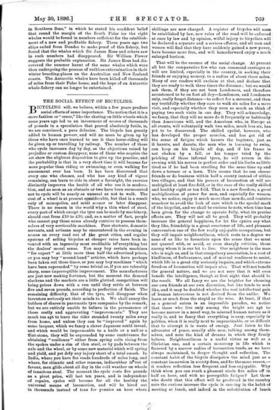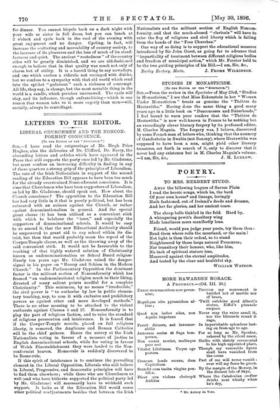THE SOCIAL EFFECT OF BICYCLING.
BICYCLING will, we believe, within a few years produce social effects of some importance. The notion that it is a -mere fashion or" craze," like the skating on little wheels which some years ago led to an investment of scores of thousands -of pounds in a speculation that proved absolutely futile, is, -we are convinced, a pure delusion. The bicycle has greatly .added to human powers, and will no more be given up by those who have once learned to use it than horse-riding will -be given up or travelling by railway. The number of those who cycle increases day by day, as the objections raised by ,prejudice or custom disappear, none of those who acquire the art show the slightest disposition to give up the practice, and the probability is that in a very short time it will become far more popular than riding or swimming, or even walking for amusement ever has been. It has been discovered that every one who chooses, and who has any kind of vigour remaining, can learn to ride in about a fortnight, the exercise -distinctly improves the health of all who use it in modera- tion, and as soon as an obstacle or two have been surmounted not to cycle will be nearly as unusual as not to walk. The -cost of a wheel is at present considerable, but that is a result only of monopolies, and meat sooner or later disappear. There is no reason in the world why a thin wheel of steel, -every part of which except the tyre can be made by machinery, should cost from 210 to 230, end, as a matter of fact, people who cannot pay those sums already contrive to possess them- selves of very serviceable machines. Poor students, domestic servants, and artisans may be encountered in the evening in scores on every road out of like great cities, and regular systems of selling bicycles at cheaper rates have been in- .vented with an ingenuity most creditable toi everything but the dealers' moral sense. You may buy certain machines 4‘ for export" at little more than half the advertised prices, -or you may buy "second-hand" articles, which have perhaps been taken out three times, or you may buy machines "which have been superseded" by some trivial or, if you are tolerably sharp, some imperceptible improvement. The manufacturers are just now making fortunes, but the moment the demand slackens and the markets are a little glutted, competition will bring prices down with a run until they settle at between .five and seven pounds, according to perfection of finish. The remaining difficulty, that of the tyre, will disappear when inventors seriously set their minds to it. We shall annoy the -holders of shares in pneumatic tyre companies by the remark, but we are entirely unable to believe in the permanence of those costly and aggravating "improvements." They are much too apt to leave the rider stranded twenty miles away from home, and unless they can be "improved" again by -some lacquer, which we fancy a clever Japanese could invent, and which would be impermeable to a knife or a nail or a -flint-stone, they will be superseded by some contrivance for -obtaining "resilience" either from spring coils rising from the spokes under a rim of thin steel, or by pads between the axle and the wheel, or by some new material which will spring -and yield, and yet defy any injury short of a total smash. In India, where you have flat roads hundreds of miles long, and -where, for climatic and other reasons, indiarnbber iout of favour, men glide about all day in the cold weather on wheels of tenacious steel. The moment the cycle costs five pounds as a pivot price, will last ten years, and is independent -of repairs, cycles will become for all the healthy the universal means of locomotion, and will be hired out in thousands instead of tens for pennies an hour where
shillings are now charged. A register of bicycles will soon be established by law, new rules of the road will be enforced at once by law and by opinion, wilful injury to bicyclists will be declared a separate and a serious offence, and all men and women will find that they have suddenly gained a new power, have become more free, and will henceforward enjoy a much enlarged horizon.
That will be the essence of the social change. At preeent all but the comparative few who can command carriages at will are limited, especially in the country, in seeking their friends or enjoying scenery, to a radius of about three miles. Many of our readers will exclaim at that, and declare that they are ready to walk three times the distance ; but we would ask them, if they are not born Londoners, and therefore accustomed to be on foot all day—Londoners, and Londoners only, really forget distance—to reflect for a moment, and then say truthfully whether they care to walk six miles for a mere visit, and especially whether they even so much as think of paying two such visits in one day. They will acknowledge, we fancy, that they will no more do it frequently or habitually than Americans will, and the American who, in Europe at all events, will voluntarily walk two miles, much less six, has yet to be discovered. The skilled cyclist, however, who has developed the proper muscles, and has got rid of the sense of fatigue which haunts the beginner, just as it haunts, and daunts, the man who is learning to swim, can keep on his bicycle all day, and if his frame is not shaken by a fall, or his temper tried by the pricking of those infernal tyres, he will return in the evening with his nerves in perfect order and his limbs as little tired as if he had been strolling for the same time up and down a terrace or a lawn. This means that he can choose friends or do business within half a county instead of within two villages, and that his powers of locomotion at will are multiplied at least five-fold, or in the case of the really skilled and healthy eight or ten fold. That is a new freedom, a great multiplication of power for men, and especially for women, who, we notice, enjoy it much more than men do, and contrive somehow to avoid the look of care which is the special mark of the bicyclist, and we shall be curious to note, when time has been given for the change to operate fully, what its precise effects are. They will not all be good. They will probably increase the general happiness, for let the cynics say what they like, friendship is a great sweetener of life, and pleasant conversation one of the few really enjoyable occupations, but they will impair neighbourliness, which rests in a degree we none of us like to formulate upon the sense that we must not quarrel with, or avoid, or even sharply criticise, those among whom-it is our lot to live. Our neighbour is the man who is nigh us, and in that compulsory association, is a root of kindliness, of forbearance, and of mutual readiness to assist, which life in a great city seriously impairs, and which extreme freedom of locomotion will impair also. That will not benefit the general nature, and we are not sure that it will even benefit the intelligence, though at first sight that should be the result. We all fancy we are the brighter for choosing our own friends at our own discretion, but like tends to seek like, and it may be doubted whether the real intellectual gain of human intercourse is not derived from the unlike. We learn as much from the stupid as the wise. At least, if that as a general axiom is an impossible paradox, we notice that those who live only among the bright are apt to become narrow in a novel way, to misread human nature as it really is, and to fancy that everything is easy, especially in politics, when it is really next to impracticable, or Bo difficult that to attempt it is waste of energy. Just listen to the advocates of peace, usually able men, talking among them- selves, and note the kind of dreams in which they firmly believe. Neighbourliness is a useful virtue as well as a Christian one, and a certain monotony in life which is fostered by a narrow radius of locomotion tends, as we have always maintained, to deeper thought and reflection. The constant habit of the bicycle dissipates the mind just as a constant immersion in society does, and for the same reason,— it renders reflection less frequent and less enjoyable. Why think when you can reach a pleasant circle five miles off in half an hour, and with no perceptible fatigue ? Let those who doubt that this effect will be produced in the country note the curious increase the cycle is causing in the habit of meeting at lunch, and indeed in the substitution of lunch for dinner. You cannot bicycle back on a dark night with your wife or sister in full dress, but you can lunch at 2 o'clock and cycle back in the cool of the evening with great enjoyment and no danger. Cycling, in fact, will increase the scattering and moveability of country society, to the increase of its pleasures and the loss of much of its stead- fastness and quiet. The ancient " rootedness " of the country sides will be greatly diminished, and we are old-fashioned enough to believe that in that quality was much not only of charm but of utility. It is a horrid thing to say nowadays, and one which excites a ridicule not untinged with dislike, but we confess to a sympathy with that old world which read into the epithet " gadabout " such a richness of contempt. All life, they say, is change, but the most mutable thing in the world is a candle, which perishes unrenewed. The cycle will stay, and its influence, though enfranchising—which is one reason that women take to it more eagerly than men—will, socially, always be centrifugal.



































 Previous page
Previous page